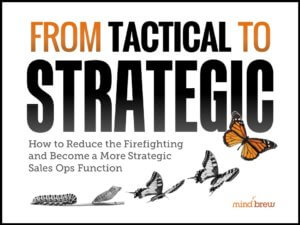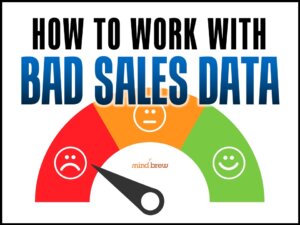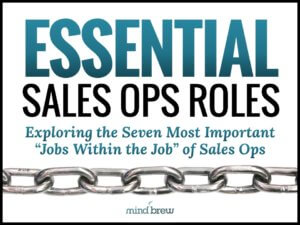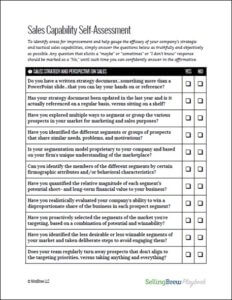Measuring sales performance is core responsibility for most Sales Ops groups. Admittedly, some groups are only doing it to “check the box” on a deliverable for management or someone else. But the majority of groups are measuring sales performance with a genuine desire to better understand what’s going on…good, bad, and ugly…so that they can drive meaningful improvement.
That said, however, there are certain mistakes that will undermine the best of intentions…
Instead of spurring meaningful change, your measures and metrics could end up just being ignored. Worse still, publishing or sharing inaccurate measures could embarrass you personally and hurt the credibility of the entire Sales Ops function. And should you manage to make operational changes based on faulty measures, you could cause some serious damage to the business itself.
So, you’ve got to be diligent and get it right. To that end, here are three measurement mistakes you’ll want to sidestep along the way:
1. Only measuring what others want to see.
If all you’re doing is measuring what others say they want to see, you are most likely missing some of the most important performance dynamics. You see, others will only be able to tell you about what they are already doing or what they already know is possible. So it’s not surprising that they won’t be able to tell you what they’re missing. Quick! Tell me everything you don’t know!
Beyond what’s wanted, you should also strive to provide what’s needed. This requires thinking hard about your business model, stage, etc. to determine which metrics and measures align to critical business dynamics. And if you need some ideas, study what other Sales Ops groups are measuring. (We have a lot of resources in the Playbook that can help on this point.)
2. Attempting to compare the incomparable.
Comparisons are essential for analysis and assessment. Simply put, you really can’t know whether something is “good” or “bad” or “on” or “off” until you compare it to something else. But the quality and accuracy of those assessments and conclusions is entirely dependent on the comparative basis. And one of the biggest mistakes groups will make is setting up apples-to-oranges measurements.
For example, they’ll compare the performance of salespeople, thinking that because they’re all reps, it’s an apples-to-apples comparison. But when each rep’s mix of business is different, it’s not even reasonable to expect similar performance. And because the comparison is messed up from the start, any findings or conclusions that result will also be flawed.
These types of unreasonable apple-to-oranges comparison are also often made between different customers, segments, territories, product lines, and even entire countries. Doing this not only makes for inaccurate analyses, it can damage your credibility as others spot these mistakes and conclude that you really don’t understand the business as well as you should.
3. Leaving conclusions too open to interpretation.
When sharing sales metrics and measures with others, Sales Ops groups will often stop short of drawing conclusions. They’ll go through all of the work to ensure they’re measuring the right things and using proper comparisons to enable accurate judgments as to what’s “good” and “bad.”
But then, they’ll leave the “Why is it happening?” and “What should we do about it?” questions completely open to interpretation. Maybe they don’t think it’s their place to draw these conclusions. Or maybe they think the conclusions are obvious, given the data being shown.
Whatever the reasons or rationalizations, it’s a mistake. You can’t assume that others will have the analytical skills to properly interpret the data and draw the right conclusions. And it’s absolutely your place to draw conclusions about what the data is showing! After all, you’re closest to it and understand it better than anyone else.
So you should always include your observations, conclusions, and ideas for possible next-steps. Worst case, it will all be ignored. But odds are that at the very least, you’ll steer people clear of the wrong conclusions…and that’s more than half the battle!













